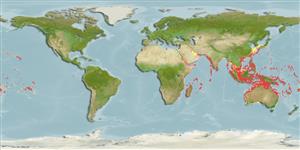Environment: milieu / climate zone / depth range / distribution range
Ecology
Marine; reef-associated; depth range 2 - 86 m (Ref. 95664). Tropical; 42°N - 40°S, 30°E - 137°W
Indo-Pacific: East Africa to Marquesan and Mangaréva islands, north to southern Japan, south to Queensland, Australia and Kermadec (Ref. 8879) and Austral islands.
Size / Weight / Age
Maturity: Lm ? range ? - ? cm
Max length : 20.0 cm TL male/unsexed; (Ref. 4313)
Dorsal spines (total): 13; Dorsal soft rays (total): 11 - 12; Anal spines: 3; Anal soft rays: 6. Reddish to tan with many dark bars on body; median fins with scattered dark spots; tentacle above eye long and with dark bands (Ref. 4313). Adults with bluish black blotches near the base of the pectoral fins (Ref. 48635)
Occurs in lagoon and seaward reefs. Hides in crevices under rocks and coral formations during the day and hunts at night. Typically with head towards the safety of their hide-out or narrow passage (Ref. 48635). Feeds on shrimps and crabs. Venomous and capable of inflicting a painful sting. Minimum depth reported taken from Ref. 30874. Solitary or in groups, under ledges and holes (Ref. 37816).
Life cycle and mating behavior
Maturities | Reproduction | Spawnings | Egg(s) | Fecundities | Larvae
Eschmeyer, W.N., 1986. Scorpaenidae. p. 463-478. In M.M. Smith and P.C. Heemstra (eds.) Smiths' sea fishes. Springer-Verlag, Berlin. (Ref. 4313)
IUCN Red List Status (Ref. 130435)
Human uses
Fisheries: subsistence fisheries; aquarium: commercial
Tools
Special reports
Download XML
Internet sources
Estimates based on models
Preferred temperature (Ref.
123201): 24.6 - 29, mean 27.8 °C (based on 900 cells).
Phylogenetic diversity index (Ref.
82804): PD
50 = 0.5005 [Uniqueness, from 0.5 = low to 2.0 = high].
Bayesian length-weight: a=0.01023 (0.00444 - 0.02358), b=3.01 (2.82 - 3.20), in cm total length, based on LWR estimates for this (Sub)family-body shape (Ref.
93245).
Trophic level (Ref.
69278): 3.9 ±0.61 se; based on food items.
Resilience (Ref.
120179): Medium, minimum population doubling time 1.4 - 4.4 years (Preliminary K or Fecundity.).
Fishing Vulnerability (Ref.
59153): Low vulnerability (10 of 100).
Nutrients (Ref.
124155): Calcium = 67.2 [33.6, 147.9] mg/100g; Iron = 0.633 [0.338, 1.691] mg/100g; Protein = 18.1 [16.2, 20.1] %; Omega3 = 0.232 [0.104, 0.617] g/100g; Selenium = 30.9 [16.8, 74.3] μg/100g; VitaminA = 140 [49, 374] μg/100g; Zinc = 1.41 [0.99, 2.00] mg/100g (wet weight);
